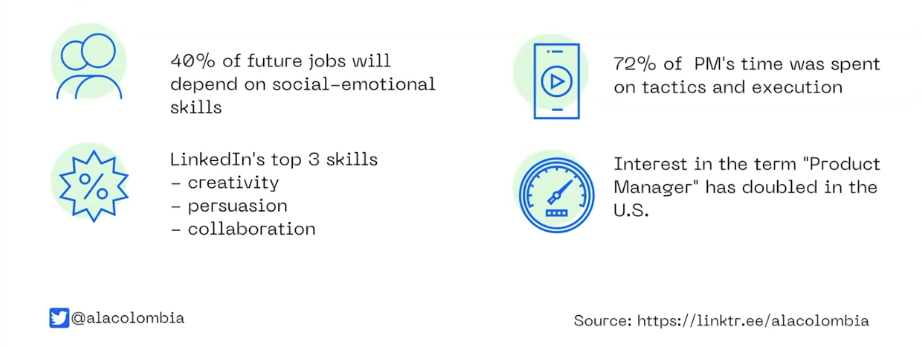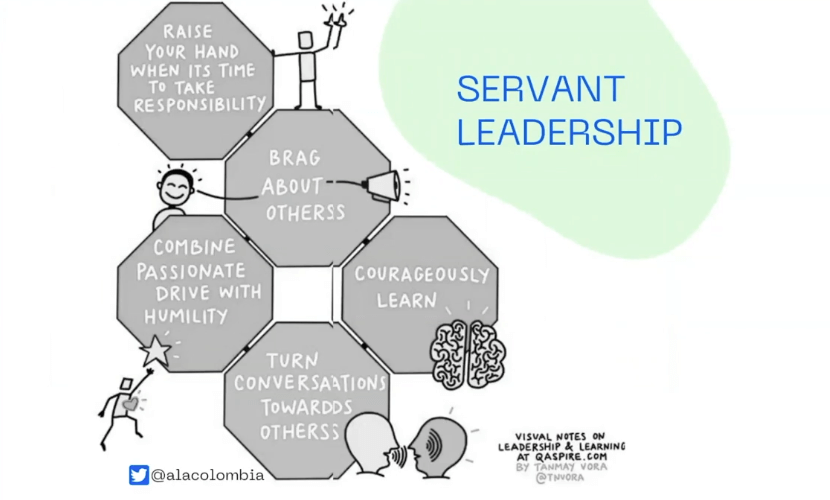This article is taken from a presentation given by Andrea Griffiths at Product-Led Festival 2022. Hear the whole unedited talk on demand right here.
My name is Andrea Griffiths, I’m a Senior Product Manager at GitHub, where millions of developers and companies build, ship, and maintain their software.
Let's go back in time for a moment. A couple of interesting things happened in 1912. The first batch of Coca Cola for commercial purposes was produced, Woodrow Wilson was the sitting US president, and the Titanic, ‘the unsinkable ship’ sank.
Finally, Dale Carnegie's book How to Win Friends and Influence People was published.
This book was published 110 years ago, yet it remains relevant today. Why? Because formal education is not enough. There’s a whole different set of tools we need to apply as product managers to get the job done.
In this article, we'll be examining some of these principles, together with some of the things I learned from my experience working at a fast-paced organization.
Here’s a breakdown of our main talking points:
- What it takes to create authentic relationships in product
- Being an effective product manager
- What tools you can use to influence decision-makers in a positive way
Let’s dive in. 👇
What it takes to create authentic relationships in product
Out of all the traits that make you a great product manager, the ability to influence teams, to earn their trust, are often underrated skills. Being able to influence your company's vision to execution is what's going to make you a successful and influential product manager.
Soft hard skills
I've worked with a wide range of talented people and one thing’s for sure, not everyone possesses the ability to get along. Not everyone could work and interact together in a business setting. Let’s be honest, it's not easy.
Getting along, working, and interacting in a business setting is a fine art.
This is where you, as a product manager, can differentiate what you bring to your company.
Key Facts
I'm a numbers person, so I want to hit you with some hard facts here to help us figure out why it even matters.

In 2020, Microsoft and McKinsey published a paper called The class of 2030. This paper had interesting findings on higher skills. One of the conclusions of the research was that close to 40% of all future jobs are going to be highly dependent on your social-emotional skills.
In other words, about half of the market opportunities are going to heavily lean on your ability to get along with others.
LinkedIn did a study in 2019-20 in which they took a look at all of the job postings on LinkedIn and the sub-set of skills required for each specific role.
They found that the top three skills companies were hiring throughout those years were creativity, persuasion, and collaboration. We're back to hard skills and social-emotional intelligence.
More time spent on strategy
The product managers are in agreement that they would much rather spend time setting a strong strategy than on tactics and execution. However, that’s not the reality of the landscape or the reality of product management today.
The amount of product managers’ admin work has a lot to do with our use of those social-emotional skills and the way we interact with others at the workplace.
It's extremely valuable to take a look at a subset of tools that can help you work faster and smarter.
These are things that are not only gonna impact your efficiency as a product manager but help you maneuver yourself into a position of having greater influence in your organization, and a greater influence in the way strategy is set.
In the end, this is gonna make your job easier, it's going to make you and your team shine rather than being sidetracked by all these other things.
Meet Ivy, the PM
I've noticed a pattern in the past couple of years as people are coming into product management, that there’s a tonne of new grads entering the workforce as product managers.
For example, we have Ivy, a brand new PM, fresh out of a top school, who is eager to make their mark and to be recognized.
They’ve come to the team with a brain full of absolutely fantastic theory, created all these wonderful colorful Gantt charts, and written a couple of analysis reports and they are fantastic communicators.
After all, they aced that English Lit class and they’re smart, so they were hired on top of their salary band. We’re eager to welcome Ivy to our team.

Then we fast forward one or two review cycles and Ivy is now in this position👆. They’ve come to realize that tech is broken, they want no part in it and it's a bit disappointing to them to reach this point.
There was so much promise at the start of their career. There was so much theory, studying and formal education, what happened to Ivy and what could they have done differently?
The ability to inspire and influence others
They had the theory, the drive, and they were go-getters, but they lacked a special set of skills. They couldn’t inspire and influence others.
No matter how many sprints they were able to propose and how many revisions to the roadmaps they were able to influence into getting approved, their team was simply not meeting expectations.
That also meant they weren’t meeting expectations. I see this happen quite often because we undermine the importance of hard skills and what it takes to get the job done.
Your mission: To be an effective product manager
To be an effective product manager, you have to get along with people, with your engineers, with other product managers, with people who love your product, with people who hate your product, with your boss, with your CEO, and you have to use and apply all of this social-emotional intelligence.
You're doing this not because you're keeping track of your follower account, or because you're consumed by being a popular person in your organization, but because you care about your product and about accomplishing your company's vision.
You understand, at your core, that the only way for you to exceed expectations is to lead your team into exceeding expectations themselves.
Getting the Job done
I came to be a PM later in my career. In a way, this was a big advantage to me because I had a lifetime of experiences in a variety of business settings in different lifetimes. Some were very serious, with life or death consequences when I was a soldier in the US Army.
I then worked renovating REO and Fannie Mae properties, which was a very demanding construction management job with components of product and program management. All of these experiences gave me the tools necessary to be an effective product manager.
Some of the things I took to heart during those experiences is that, regardless of the setting, whether it was being a sergeant or being a construction manager, getting the job done is about:
- 🤝 Collaboration
- 👥 Relationships
- 🤓 Your aptitude
- 💡 The way you present your ideas to others
Servant leadership

Interestingly enough, in 2022 there are no more sun gods but there are plenty of people who think the sun revolves around them.
You can influence, get the job done, and move up in your career, and you can do all these things through servant leadership. You can use the humility that comes with being a servant leader.
Servant leadership is about the greater good, teamwork and about presenting your ideas in a way that is full of humility and inspiration. At the end of the day, those are things that are going to help you accomplish your goals and stay in this world for the long run.
The popularity of the term ‘product management’ has doubled in the past two years.
If more people are researching what a product manager does, it means we're going to have a tonne more competition and people coming into the field, whether it be from engineering, from other backgrounds or career changers very much like myself.
Using these tools, taking your life's work with a central approach of humility and servant leadership is going to be a key differentiator between what you bring and what they bring to the table. All of these things are geared to making you more exceptional at what you're already doing.
Your tools
This is not an inclusive or exclusive list, these are some of the tools I've used daily for my work at a fast-paced, impactful organization. Take what resonates with you and I hope it helps you improve a development lifecycle or the way you interact with your team.
Be humble
This is perhaps one of the most important skills that a product manager can have, the ability to just embrace silence and tune in to what your team is saying.
When we're presenting how we're going to get it accomplished, sometimes we get caught in this confirmation bias cycle where we're looking for ways where we can get folks to agree with us and what we're saying.
We do this often without understanding and taking a moment to listen to their input, what they think could be modified, or improved.
Feedback is important. Take a moment to listen to others and take to heart that sentiment of humility, being quiet and listening to your team is an excellent show of leadership.
It doesn't mean you’re not going to proceed with the roadmap, if that's what the company wants, it doesn't mean you're going to disregard the direction your superiors have given you, but it means you're going to take a moment to acknowledge your team, and the ideas they're bringing to the table.

Be sincere & encourage sincerity
We need to develop a pattern of recognizing good things. Take a look at your team and find one thing in every individual. This will help you have some sincere appreciation for them.
When you find that one thing, share it and sincerely spread that appreciation for others. It can be related to the way they're executing your vision or the way they are showing up and presenting themselves at work.
This will encourage other people to do more good things as they’re receiving constant feedback of sincere appreciation.
Encouraging sincerity is also essential. I encourage radical honesty, and that means when you're talking to me you don't need to beat around the bush when you're going to give me feedback.
I'm going to listen, encourage you and I embrace your dissenting voice and constructive conflict. I know at the end of these conversations, even if they're tough, I'm going to come out smarter and we're going to come out with a better bond.
Don't surround yourself with ‘Yes people’. Encourage people to have a level of sincerity and openness with you when they bring you that feedback. Keep in mind that all feedback is very good feedback, whether it's positive or negative, it's an opportunity for you to expand growth and learn.
Be accountable
If something happened and I dropped the ball and made a mistake, do I wait until my team figures it out? Do I wait until this impacts the way we are working? No, I don't. I'm going to quickly admit I made a mistake.
I do this because I encourage sincerity, and I want to be a sincere person. Quickly admitting my mistakes has an interesting effect on the human psyche. It makes you demonstrate your humility, shows leadership and makes you more likable.
Be empathetic
This is a hard skill for some to grow and nurture organically, and sometimes we need to learn these things. I had to relearn how to work in a business setting. In the Army, I always used to rely on the authority my rank gave me to influence what my team was doing.
I had to learn how to lead with humble leadership and lead with empathy and that's made a big impact on my career. Remember to have empathy for everything and everybody.
As a PM, your job is often to:
- Encourage and keep engineers on the task
- Be able to stick to the roadmap
- Be able to deliver and be open to iteration
- Be able to shift and pivot and change things when change is required
Sometimes you have to be the person who comes to your team and delivers bad news. These hard conversations are 20,000 times harder if you are only communicating and relaying information because of your position as product manager.
What happens if you are communicating and interacting with this information in your team, with a brain and a heart full of empathy is a completely different experience and the reception is completely different.
Be flexible & stay curious
We wear many hats depending on the stage of your company. You need to be able to have the knowledge and the capacity to apply analytical discipline and understand data.
One of the best pieces of career advice I've been given is “roll up your sleeves and dig into it, even if it's something that isn’t your forte”.
Now, I'm not saying all of us need to become data scientists but you do need to understand how the data is manipulated. How was it reported? Why?
Because nine times out of 10 those metrics are directly tied to what will constitute a successful team vs. an unsuccessful team, a team that's meeting expectations vs. a team that's exceeding expectations.
Learn how to manipulate data so that you can make informed decisions about the direction the work is going in, and familiarize yourself with what metrics you're being evaluated on. What metrics is your team being evaluated on? Be flexible about it. Keep that curiosity.

Be the person who gets a yes
Even if a small segment of your user population is using a feature, it’s something they're relying on and using.
Big companies and small companies at all stages will make this mistake at one point of going in guns blazing without doing the proper research or having empathy for the users (regardless of how small the population of users is) and start axing things that may not be a priority to us.
This is an easy way to lose the business and lose your users.
Instead of saying no, or accepting a no, you're going to be the person who gets a yes. I become this person by being flexible, having the knowledge, the ability to manipulate the data, and being able to present it in a way that isn’t confirmation bias.
We need to stop and think about what is in the best interest of our users, whether it be 100 users or a million users.
Sometimes when you present hard data like this and inform and form reports to your superiors or the people who are guiding the direction of certain projects, you get to open the can and get them to look inside and consider things that perhaps didn't come to mind.
It's been my experience that if you present educated and informed reports and make good arguments, especially when they impact the bottom line of business, you will get your point a lot farther.
Be constructive
More important than the feedback itself is how and when you give it. I would encourage you to avoid over-criticism.
Criticism is non-constructive when it’s overly done. It tends to, unfortunately, build resentment. If there are no actual positive improvements or actual feedback to take from it, it's just a bashing session.
Even if their intentions are good and they want to do what's best, immediately, pride gets in the way and we end up hurt, especially if you are someone who struggles with impostor syndrome.
The next time you have to deliver feedback, think about being constructive and the way you do it.
First of all, step back and think about how not only you're going to point out what's wrong but how you're going to throw in some action items, or some suggestions on how things can be improved.
This makes for better feedback and it works in creating the real cohesiveness necessary to get the job done.
Be inspiring
You want to be the Challenger on your team. A big part of the work you do as a Challenger is to be inspiring, how you inspire others to either learn more or do the best work of their lives. Inspire your team to excel beyond their imagination!
This doesn't mean you're gonna take a quarter's worth of work and cram it into a two-week sprint.
This means you're going to be sincere, with a heart full of empathy, and also make it your mission to challenge each individual on your team to overcome their limitations and to expand and take ownership of their work in a way that makes them want to show up for work.
Working in tech, there is so much to know, so many programming languages, and our product has so many features, that I came to realize there’s no way I'm going to be an expert at every single thing.
The best course of action is to lean into your strengths. You can do this for your team as well. Be the person that challenges, who inspires, and if needed, be the person who brings up strengths.
Be a team player
When one of us shines, all of us shine. You should embrace it as a philosophy as a product manager. Product management is collaborative. To get the best results, you want to be a team player and you want to sincerely be a part of your team.
When someone on my team has a win, that’s my win and I'm going to be happy for you. If you're slacking on something, or if there’s something that I can help you get to that win, I'm going to help you sincerely because I know that it's also my win.
Take a team player-centric approach to the way you handle interactions in your team. I truly believe you can be an effective and influential product manager by applying these tools to your work daily.


